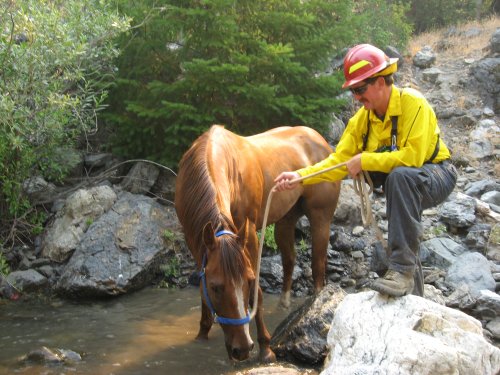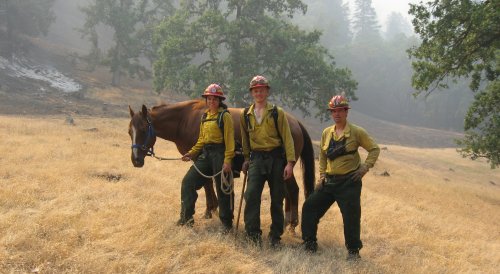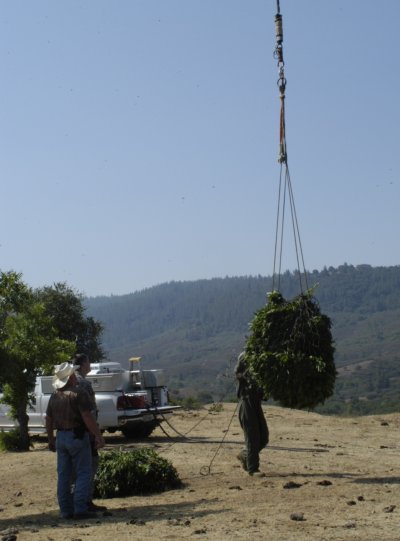
Rob Brown (left) looks on as a large amount of marijuana removed from illicit gardens he discovered on his property last week is dropped by a helicopter used to transport the plants from the grow area. Photo by Elizabeth Larson.
THIS STORY HAS BEEN UPDATED
KELSEYVILLE – On Wednesday, state and local officials eradicated thousands of illegal marijuana plants which Supervisor Rob Brown found on his property last week.
The Campaign Against Marijuana Planting, or CAMP – a multi-agency task force including members from the Lake County Sheriff's Office, Fish and Game, California Department of Justice and California Highway Patrol, among them – pulled out the illegal gardens in a Wednesday morning operation.
Approximately 4,887 marijuana plants, which were not yet bearing buds, were cut down and buried on the property near Bottle Rock Road in Kelseyville, said Ryan Pontecorvo of the California Department of Justice, who was participating in the plants' removal.
Brown said the plants initially were discovered last Tuesday and Wednesday, when a heavy equipment operator working to clear brush on the land was confronted by a Hispanic male who tried to make the operator leave the area.
Since then, flyovers revealed the grow area encompassed about 100 of Brown's 300 acres, running along draws and low areas between the area's hillsides.
Tree and brush canopy shaded the garden from view, but Brown said the bright green color of the young marijuana plants was clearly visible from the air.
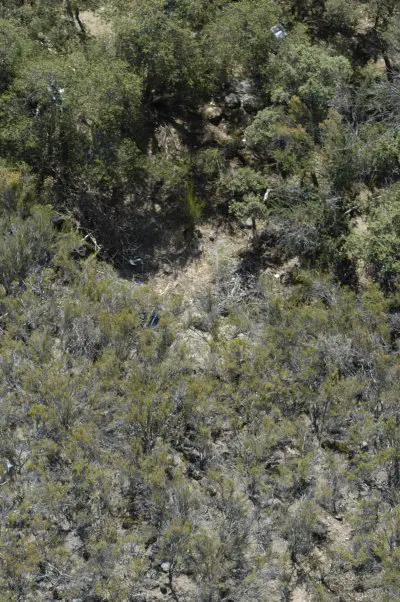
A shot from a helicopter shows garbage tucked under the brush canopy at the top of the picture. This is taken after the marijuana plants were pulled out from around the trees. Photo by Elizabeth Larson.
In one spot, Brown said a spring that drains into a dry creek bed that runs only in the winter time – and which feeds into Cole Creek – was dammed as a water source for the plants.
A sheriff's office SWAT team went into the gardens early Wednesday morning before the eradications began in an attempt to locate any grower suspects, Pontecorvo said. No individuals were found in the growers' camp, which was located in thick brush on Brown's property.
Although none of the growers were found Wednesday, Pontecorvo said law enforcement did find a burning candle at the camp, which the superstitious growers light as an offering to a protective saint but which also posed a fire danger. They also found shotgun shells, he added.
A helicopter trip over the area late Wednesday morning showed extensive amounts of drip line and garbage the growers had left behind.
Pontecorvo said the operation likely had been built up over a period of years. Finding such grows on private land, when the property owner isn't aware of it, is not uncommon, he said.
Brown's small herd of buffalo stood on a hillside overlooking the scene as Pontecorvo and about 20 other law enforcement task force members and support staff went about the work of destroying the plants.
Many of the men – wearing green or camouflage fatigues complete with radios, drinking water and weapons – were dropped into the gardens on a 100-foot long line via a helicopter in a technique called Short Term Airborne Operation, or STABO, which they began using in 1993.
Pontecorvo said using the helicopter allows them to cover more land area quicker. In the case of Brown's property, they were able to traverse the large amount of acreage in only about two and a half hours.
Berk Berkley, who has been with CAMP since he retired as the sheriff of Madera County in 1986, said the helicopter's $809 per hour services are provided for free to counties that participate in CAMP, which is funded primarily by the federal Drug Enforcement Administration and run by the California Department of Justice.
As to who was responsible for the illicit marijuana grow, Pontecorvo said it's most likely Mexican men hired by Mexican organized crime. He said the men are brought over the border by “coyotes” – or people smugglers – and deposited in the grow area, where they're left for months at a time to tend the gardens.
Scouting for sites usually starts as early as March, said Pontecorvo, with young marijuana plant clones planted in the areas and assisted in their growing by heavy doses of fertilizers such as Miracle-Gro or Romeo, which can wreak havoc on the environment.
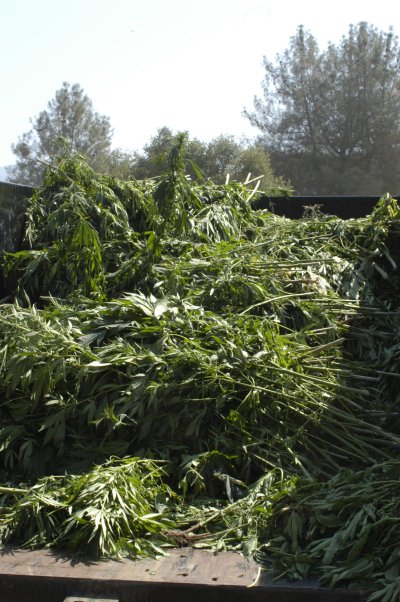
The marijuana did not yet have buds on it. Officials buried it at Brown's property. Photo by Elizabeth Larson.
Berkley said growers like places like Lake County because it's very isolated. “That's what they look for.”
Brown and his wife, Kim, were still unnerved by the thought that they and their children had been close to the area where the growing activity was taking place. Trails around the sites are popular horseback riding areas for the Brown children and their friends.
The Browns also reported that a large beef cow of theirs had gone missing, with the last tracks of hers that they found leading up to some pine trees on the hillside, where the gardens also extended. The conclusion, at least for now, is that she may have become meat for the growers.
Pontecorvo said CAMP's Region 5 team – which covers Lake County – is spending a lot of time in the county these days.
Last week, CAMP activities in Lake County resulted in the eradication of approximately 53,472 marijuana plants with an estimated street value of $240 million, as Lake County News has reported.
Pontecorvo said the height of the eradication season is July 1 through mid-October.
One of the issues the Browns are still facing is cleanup. Pontecorvo said cleaning up an acre of land after an illegal garden is eradicated costs about $11,000 – from filling in cisterns dug to water the plants to dealing with miles of leftover irrigation drip line, besides damages to wild animals and natural vegetation, which can be harder to address.
Rob Brown said he'll start hauling out garbage and small portable propane tanks left behind by the growers, the latter a particular safety hazard in light of this year's volatile fire season.
Pontecorvo emphasized that anyone who comes across an illegal marijuana grow – whether on private or public lands – should leave the area immediately and notify law enforcement. He said growers often are armed and very dangerous, with recent cases being reported in other parts of the state where someone happening across a grow was killed.
E-mail Elizabeth Larson at elarson@lakeconews.com.
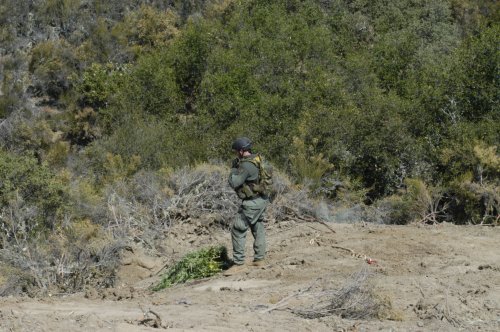
A task force member stands uphill of a camp they located deep in the brush. Photo by Elizabeth Larson.
{mos_sb_discuss:2}







